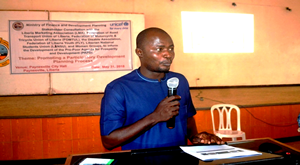 Monrovia, Liberia - The Ministry of Finance and Development Planning (MFDP) along with its partner, UNICEF, is seeking inclusive ideas on the formulation of His Excellency President George Manneh Weah’s Pro-poor Agenda for Development and Prosperity.
Monrovia, Liberia - The Ministry of Finance and Development Planning (MFDP) along with its partner, UNICEF, is seeking inclusive ideas on the formulation of His Excellency President George Manneh Weah’s Pro-poor Agenda for Development and Prosperity.
The new Government of Liberia headed by President Weah through the Ministry of Finance and Development Planning under the stewardship of Hon. Samuel Tweah Jr., has decided to draw an all-inclusive development plan that will guide the country’s development for the next five years.
Addressing scores of marketers, motorcyclists, women and student groupings at the start of a consultative meeting in Paynesville, Assistant Minister for Regional and Sectoral Planning, Hon. Benedict Kolubah, said the government seeks holistic inclusive ideas on the formulation of the administration’s Pro-poor Developmental Agenda.
During the meeting held on Thursday, May 31, 2018, at the Paynesville Town Hall in Paynesville City, Assistant Minister Kolubah noted that the intent of the consultation is to have the poor people or ordinary Liberians involved in the formulation of the country’s next developmental plan which is expected to positively transform the lives of the poor.
In the formulation of the Agenda, Minister Kolubah explained that Government has adopted a people-centered approach that solicited the inputs of ordinary citizens who these developments would eventually affect rather than hiring of consultants to do the paper works.
He then added, that this is why the Ministry with support from United Nations Children Fund (UNICEF), thought to include the marketers, motorcyclists, vulnerable groups, women so that they can participate in the process and as well help in explaining same to their peers.
Assistant Minister Kolubah also clarified that the Pro-poor Agenda does not seek to take away the Vision 2030 Agenda that aspired to make Liberia a Middle Income Country by 2030, but to ensure that the current administration development’s strategies accelerate the achievement of that goal by the alignment of relevant policies in a more robust way that will factor in the majority of the people at the base of the economic ladder.
He continued, “having exhausted the Poverty Reduction Strategies (PRS) and the Agenda for Transformation (AfT) of the just-ended administration of former President Ellen Johnson Sirleaf, President Weah’s Pro-poor administration seeks to ensure that the Vision 2030 is more realistically achievable.
Assistant Minister Kolubah disclosed that the Pro-poor Agenda consists of four pillars: Power to the People, Economic Growth, Peace and Security, and Governance.
He further explained that that the pillars will generally ensure the provision of quality education, access to health and sanitation, economic empowerment of the poor through the provision of loans, agriculture and infrastructure development; peace and security and governance through decentralization and reducing inequalities.
Giving the overview of the program, Assistant Director for NGO Coordination, Raymond Ziama, said the agenda when formulated, development will give ownership to the people who are the focus of development efforts.
According to him, similar consultations are also ongoing in other parts of Liberia as well as the Diaspora.
The consultative meeting which was held in collaboration with UNICEF brought together several members of the Liberia Marketing Association (LMA), Federation of Liberian Youth (FLY), Federation of Road Transportation Union (FRTUL), Liberia National Student Union (LINSU), Association of Female Lawyers of Liberia (AFELL), the Disable Community and several other women groupings.